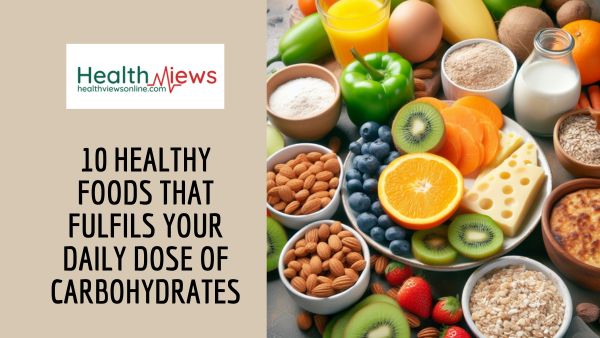Carbohydrates have acquired a terrible reputation throughout the years. They are frequently associated with weight gain, type 2 diabetes, and a range of other health problems. Yes, processed foods high in sugar and refined grains often lack essential vitamins and minerals. Many nutrient-dense, fiber-rich meals, on the other hand, can be quite beneficial to your health.
You consume 2,000 calories each day, with carbs accounting for between 900 and 1,300 of those calories. This amounts to 225 to 325 grams of carbs each day.
Also, Read Everything You Wanted To Know About Omega-6 Fatty Acids
Here are ten extremely nutritious high-carb foods.
1. Quinoa
Quinoa is a healthy seed that has grown in popularity among health-conscious consumers. It is classed as a pseudocereal, which is a seed that is processed and consumed similarly to a grain. Quinoa is a high-carb food since it contains 70% carbohydrates when cooked. It is, nevertheless, a good source of protein and fiber. Source
Quinoa is also incredibly filling due to its high fiber and protein content. As a result, it may aid in the promotion of healthy weight management and intestinal health.
2. Oats
Oats are an extremely healthy whole grain that is high in vitamins, minerals, and antioxidants. Raw oats contain 70% carbohydrates. A 1-cup (81-gram) meal of carbs comprises 54 grams, including 8 grams of fiber. They are particularly high in a form of fiber known as oat beta-glucan. Source
Oats are also a good source of protein, with more protein than most cereals. Oats may also assist in lowering blood sugar levels, especially in people with type 2 diabetes.
Also, Watch health views web stories: Most Common Calcium Deficiency Symptoms
3. Bananas
Bananas are a popular fruit that may be found in a variety of dishes. One large banana (136 grams) has roughly 31 grams of carbohydrates, which can be starches or sugars. Source
Green, unripe bananas have more starch. As the bananas ripen, this turns into natural sugars, causing them to turn yellow. Unripe and less ripe bananas are also high in resistant starch and pectin, both of which promote digestive health and offer fuel for the healthy bacteria in your gut.
4. Sweet potato
Sweet potatoes are a nutrient-dense tuber or root vegetable. One-half cup (100 grams) of mashed, cooked sweet potatoes with skin contains around 20.7 grams of carbohydrates, which are made up of starch, sugar, and fiber. Source
5. Beets
Beets are a purple root vegetable that is also known as beetroot. While they aren’t considered particularly rich in carbs, they do have a lot for a non-starchy vegetable. Beets have roughly 10 grams of carbs per 100 grams, mostly from sugar and fiber. Source
They’re also high in vitamins and minerals, as well as antioxidants and plant components. Beetroot juice is also high in nitrates, which athletes occasionally utilize to improve their performance.
6. Oranges
Oranges are a well-known citrus fruit. They’re mostly water and contain roughly 15.5 grams of carbohydrates per 100-gram meal. Oranges are high in fiber as well. Oranges are particularly high in vitamin C, potassium, and B vitamins. They also include citric acid, as well as several powerful plant chemicals and antioxidants. Source
7. Blueberries
Blueberries are commonly displayed as a superfood due to their high antioxidant content. They primarily consist of water, with 14.5 grams of carbohydrates per 100 grams. Source
In addition, a variety of vitamins and minerals, such as manganese, vitamin K, and C, are abundant in blueberries.
8. Grapefruit
Grapefruit is a citrus fruit with a sweet, acidic, and bitter flavor. It has roughly 8% carbs and is high in vitamins, minerals, and antioxidants. Source
Grapefruit, according to certain human and animal research, may benefit heart health and blood sugar management. Furthermore, further research suggests that grapefruit components may help prevent kidney stones, decrease cholesterol levels, and even potentially delay the growth and spread of cancer cells.
Also, Read Everything You Wanted To Know About Magnesium
9. Apples
Apples are well recognized for their crisp texture and sweet, tart flavor. They come in a variety of colors, shapes, and flavors, and each one has roughly 14-16 grams of carbs per 100 grams. Source
Apples contain trace levels of various vitamins and minerals. Despite this, they are high in vitamin C, antioxidants, and fiber.
10. Chickpeas
Chickpeas, often known as garbanzo beans, are a type of legume. Cooked chickpeas include 27.4 grams of carbs per 100-gram serving, as well as about 8 grams of fiber. They’re also high in plant-based protein. Chickpeas include a lot of vitamins and minerals, including iron, phosphorus, and B vitamins. Source
It’s a common misconception that all carbohydrates are bad for you. In reality, carbohydrates are abundant in many of the healthiest diets. However, if you’re on a low-carb diet, you shouldn’t eat a lot of carbs. Furthermore, refined carbohydrates, such as white bread and spaghetti, may be hazardous in large quantities. However, as part of a balanced, whole-food diet, you can enjoy these nutritious, delightful carbs.
Also, watch health views web stories: 8 Foods That Fulfill Your Vitamin A Dose





